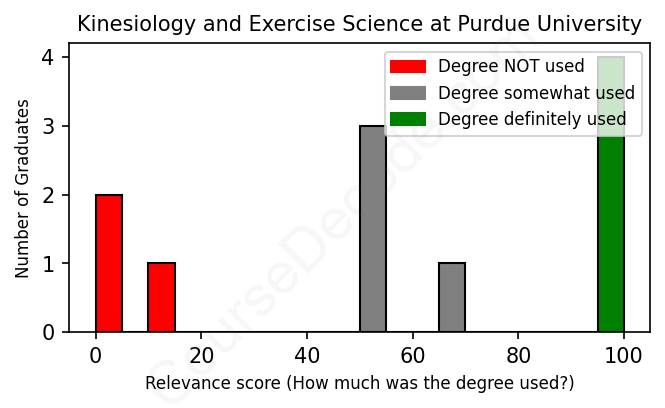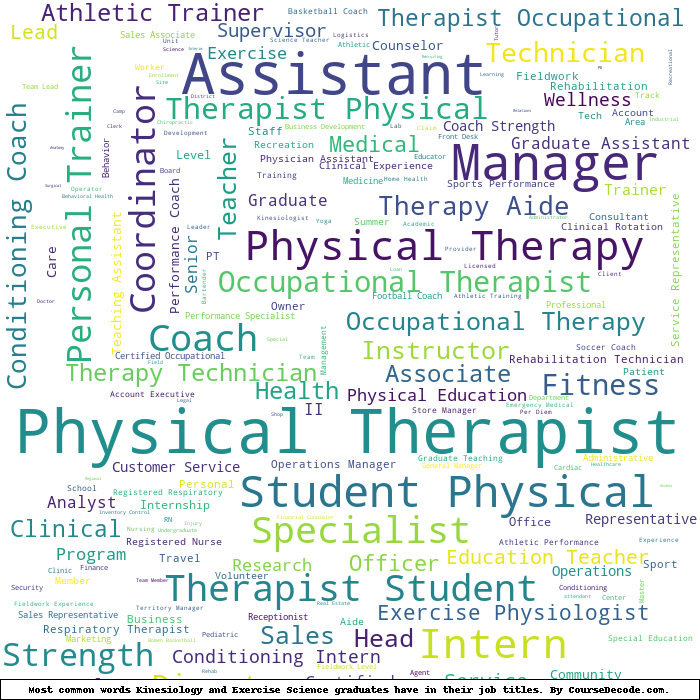
First, some facts. Of the Kinesiology and Exercise Science graduates from Purdue University we've analyzed , here's how many have used (or NOT used) their degree in their career:

These are estimates based on AI analysis of 11 LinkedIn profiles (see below).
The verdict? Below average. Overall, with an average relevance score of 57%, Kinesiology and Exercise Science graduates from Purdue University have a lower likelihood (-10%) of finding work in this field compared to the average graduate across all fields:
And for comparison, here's the chart for all profiles we've looked at across all degrees.
Also, after graduating, 45% of these graduates have pursued further education other than another Bachelor's degree (such as a Masters degree or other), compared to the average across all profiles of 35%. This suggests you may need more than just a Bachelors degree to be competitive as a Kinesiology and Exercise Science graduate.
See the details:
|
Relevance score: 54% We think this person has gone into a career only somewhat relevant to their degree. We think this person has gone into a career only somewhat relevant to their degree.
DEGREE INFOGraduated in 2015 from Purdue University with a Bachelor of Science - BS in Kinesiology and Exercise Science. Also pursued further education since (see below). JOB HISTORY SINCE GRADUATIONABA Therapist Hopebridge Oct 2015 - Aug 2016 Level II Fieldwork Rotation  Parkview Pediatric Outpatient Rehab May 2018 - Aug 2018 Level II Fieldwork Rotation  Heritage Park Aug 2018 - Nov 2018 Caregiver  Home Instead May 2017 - Present Residency Project  Hand In Hand Comprehensive Therapist Specialists Inc. Jan 2019 - Present FURTHER DEGREES DONE SINCE GRADUATINGDoctorate of Occupational TherapyHuntington University 2016 - 2019 ABOUTCurrently an occupational therapy doctoral student at Huntington University. Graduating in May of this year and plan to work in a pediatric setting following graduation. |
The top 10 most common jobs done by the graduates we've analyzed (ranked most common to least) are:
So, after looking at the LinkedIn profiles of folks who studied Kinesiology and Exercise Science at Purdue University, it's pretty clear that a lot of them have taken on roles that are closely tied to their degree. For example, many graduates have landed jobs as Physical Therapist Assistants, Rehabilitation Technicians, and Wellness Coordinators. These positions actively use what they learned in their degree program, especially when it comes to understanding body mechanics, rehabilitation techniques, and promoting health and wellness. It’s like they’re pretty much living out their studies in real life, right?
However, it’s not all directly relevant. Some grads have gone into fields like medical sales or even roles in video production, which don’t necessarily utilize the specialized knowledge from their Kinesiology and Exercise Science education. While they might benefit from having a background in health or human movement, those jobs aren't exactly what you think of when you imagine a kinesiology career. So, overall, while many graduates are working in fields that strongly relate to their degree, there’s definitely a portion venturing off into other areas that don’t make that direct connection, which is kind of a mixed bag!
Here is a visual representation of the most common words in job titles for Kinesiology and Exercise Science graduates (this is across all Kinesiology and Exercise Science graduates we've analyzed, not just those who went to Purdue University):

Looking at the career trajectories of graduates from Purdue University who studied Kinesiology and Exercise Science, it's clear that many have starting jobs that directly relate to their field. For instance, early roles like ABA Therapist, Rehabilitation Technician, and Physical Therapist Assistant stand out as solid first jobs. These positions allow graduates to apply their knowledge and skills in helpful, practical environments, like rehabilitation centers and therapy practices. It's pretty common for these folks to stick around in these types of roles for the first several years after graduation, often moving up to more senior positions within rehab or therapy settings.
However, as time goes on, some graduates seem to take different paths that veer away from traditional Kinesiology careers. For example, some have found roles in sales, marketing, and even positions unrelated to health, like a soil scientist or videographer. This diversification indicates that while many graduates do start in relevant fields, not all maintain that trajectory long-term. In about five to ten years down the line, you'll find a mix: some will have established themselves in healthcare or rehab roles, while others might pivot and take on roles in sales or even creative fields. Overall, there's a blend of success in relevant careers and some shifts into unrelated industries, showcasing how diverse the career possibilities can be after studying Kinesiology and Exercise Science.
Getting a Bachelor’s degree in Kinesiology and Exercise Science at Purdue, or anywhere really, has its challenges but isn't considered one of the hardest degrees out there. You’ll dive into some cool stuff about how the body works, exercise principles, and even some anatomy, but it's definitely more about practical applications than theory-heavy subjects like advanced physics or engineering. If you're passionate about sports, fitness, or health, you'll probably find a lot of it interesting and engaging, which can make the workload feel lighter. Just be ready for some lab work and projects, and you'll do fine if you stay organized and keep up with the readings. Overall, it’s a balanced mix—challenging enough to keep you on your toes, but not so grueling that you’ll feel overwhelmed if you’re prepared and motivated!
Most commonly, in the LinkedIn profiles we've looked at, it takes people 4 years to finish a Bachelor degree in Kinesiology and Exercise Science.
Looking at the job trajectories of these Kinesiology and Exercise Science grads from Purdue, it seems like they've had a mix of decent starting salaries but it varies quite a bit. For some, especially those who went into roles related to physical therapy or physical rehabilitation, they likely found themselves on a reasonable salary path as they gained experience. However, roles like the ABA therapist position or rehabilitation technician are often entry-level and tend to pay less, especially at the beginning of their careers. It appears that the later grads, particularly those in sales roles, could potentially be making more money since sales positions often offer commission-based pay on top of a salary. Overall, while some might be making good money, others are probably still working their way up the ladder, so it’s kind of a mixed bag!
Here is a visual representation of the most common words seen in the "about" section of LinkedIn profiles who have a Bachelor degree in Kinesiology and Exercise Science (this is across all Kinesiology and Exercise Science graduates we've analyzed, not just those who went to Purdue University). This may or may not be useful:

Here are all colleges offering a Bachelor degree in Kinesiology and Exercise Science (ordered by the average relevance score of their Kinesiology and Exercise Science graduates, best to worst) where we have analyzed at least 10 of their graduates: